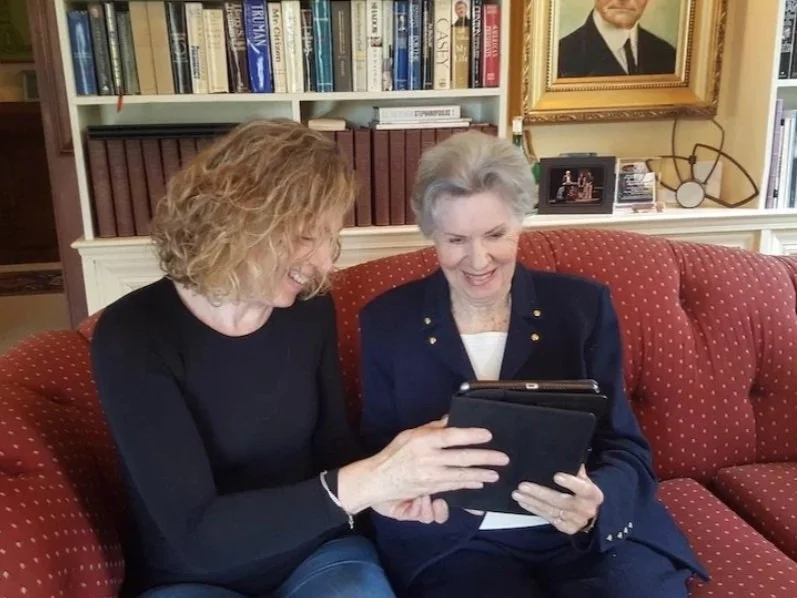Building Digital Bridges Across the Ages
Florence Mauchant, ALI 2017
Founder & CEO of NeverTechLate; empowering retirement community residents how to engage in life long learning and combat isolation through technology education
By Clea Simon
Even before pandemic lockdowns separated families and loved ones, Florence Mauchant understood the dangers of isolation. As the Founder and CEO of NeverTechLate, the 2017 Advanced Leadership Initiative Fellow has been pioneering ways to reach out, enabling digital connection for all ages.
Mauchant came to ALI looking to change her own life. She couldn’t know that the change she would find would become a lifeline in a world turned upside down. A managing partner at HT Capital Advisors, the hard-driving financial advisor had felt “really close to burn out” when a friend introduced her to Anne Welsh McNulty, a 2015 ALI Fellow. “It was a stroke of luck,” she recalled.
Although she arrived in Cambridge with many ideas, the spark for NeverTechLate came from Mauchant’s personal experience. Her mother, the eldest of four children, had left school at the age of 14 to help support her family. “She never had the opportunity to go on with her schooling, and the lack of digital education was very isolating.” When her mother went blind in her 50s, that isolation was compounded, Mauchant recalled. “She could not go on the internet. She could not understand how a smartphone worked.”
Her mother’s situation was emblematic of a growing problem. Mauchant’s research and reading at ALI confirmed her intuition that the over 65 demographic was growing as a proportion of the population, and discussions with Howard Koh, Harvey V. Fineberg Professor of the Practice of Public Health Leadership at the Harvard T. H. Chan School of Public Health, helped her understand the connection between isolation and health deterioration. “I was raised respecting my elders,” explained Mauchant. “Unfortunately, we are now very youth-focused.” And that meant more people like her mother would be increasingly shut out – with potentially deadly results.
Tackling this digital divide required a multifaceted approach – and multiple ALI contacts. Harvard Business School’s Dorothy and Michael Hintze Professor of Business Administration Karim Lakhani, who teaches digital innovation, advised Mauchant about emerging technologies – such as Zoom – which could be relevant to older adults.
The next hurdle was the advancing age of the potential students. “When we’re young, we pick up new technologies easily,” Mauchant pointed out. “When we are older, we become much more resistant to change.” At ALI, she connected with Harvard Graduate School of Education lecturer Deborah Helsing, a specialist in adult education focusing on managing that resistance and the ensuing fear of learning. Through Helsing, Mauchant learned about the Immunity to Change method, spearheaded by GSE Professor Robert Kegan and lecturer Lisa Lahey, allowing her to create a program that would incorporate this age-friendly approach.
Participants in a digital technology training session hosted by NeverTechLate
Instructor Marcayes E. Hutchins from Pennsylvania Highlands Community College (above) assists participants
NeverTechLate, digital technology training for older adults, launched in 2019, after 18 months of research. The pilot program, presented at an independent living facility, enrolled 16 older adult students in an eight-hour curriculum, parceled out as eight one-hour classes each week on Zoom. To make the class as accessible as possible, the participants used tablets, which are larger and thus easier to see and handle than smartphones and also can be easily passed around and shared.
The pilot was a success, and NeverTechLate was considering its next steps when the pandemic hit. “Learning digital skill was not an option anymore, it was an obligation,” noted Mauchant. Not only were older adults increasingly isolated, essential services moved online. Medicare and other insurance options, health records, and — eventually — vaccines were difficult, if not impossible, to access without digital literacy.
NeverTechLate, with its focus on navigating a tablet and getting online, making video calls and conducting searches, offered a lifeline. As the company goes forward, Mauchant and her team are reaching out to additional groups – such as veteran’s organizations, religious groups, libraries, and community colleges – to offer the classes. Even as the pandemic recedes, the need for digital connections and access continues.



